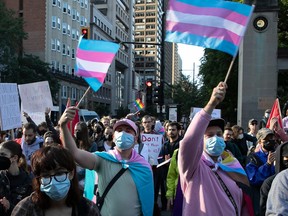When public policies appease the extremes, the Canadian narrative of diversity, inclusion and pluralism is undermined. We can fix it.

Article content
Polarization is increasing and we face the consequences. Partisan politics have plagued our public policymaking and divisive rhetoric has dominated public discourse. Social media has become a breeding ground for misinformation and division. Disinformation has been used to sow distrust, discredit political opponents, and sow doubts about democratic principles and processes.
Advertisement 2
Article content
Polarization is the process by which opinions tend to divide closer to extreme positions on a spectrum of views. Holding these extreme views makes it difficult to engage in dialogue and overcome what divides us.
Article content
Canada’s vulnerable and marginalized communities are hardest hit by polarization. Divisive narratives widen divisions between different extremes and fuel discrimination and hate, often directed at vulnerable groups. This hostile environment not only threatens the safety and well-being of marginalized people but also perpetuates a cycle of fear and mistrust within society.
The current polarized discourse on how newcomers “exacerbate the real estate crisis” or putting “pressure on social services” has undermined the Canadian narrative of diversity and inclusion. As political debates become polarized and newcomers are labeled as the “other,” and part of the problem, their dream of diversity and desire to belong is shattered. They become the target of divisive rhetoric. The Canada they imagined hardly resembles the Canada they would experience. And Quebec is no exception.
Advertisement 3
Article content
He increase in hate crimes against LGBTQI+ communities is another sobering reminder of the impact of polarization in Canadian society. In the fall of 2023, protests emerged in Quebec and across Canada against LGBQTI+ rights in schools and counter-demonstrations were organized to defend the rights of queer and trans youth. The divisive narrative of pitting parents’ rights against children’s rights It further deepened division within families and communities.
The danger of polarization goes beyond the experiences of marginalized groups, hitting us hard as it shapes government policies and influences public sentiments. When public policy appeases the extremes, misinformation dominates the public sphere, and marginalized groups are scapegoated, the very foundations of the Canadian narrative of diversity, inclusion and pluralism will be undermined. Communities will feel excluded, hate will increase and trust will erode, creating a vicious cycle that will only amplify polarization and division.
The future looks bleak. But Canadians can challenge the status quo, embrace and celebrate dialogue and diversity, and imagine a future built on respect for universal human rights.
Advertisement 4
Article content
Accepting human rights is the antidote to polarization.
Using a human rights approach leads us to use dialogue (conversations and engagement with people who have different opinions) as a tool to dismantle division. Use dialogue to remind us that all people, regardless of religion, ability, gender, sexual orientation or skin color, should enjoy the same human rights. It allows us to listen, analyze pain and suffering, and recognize stories and experiences that shape different perspectives.
Reminding ourselves that all people should enjoy all human rights is essential to breaking down the divide and allowing dialogue to be possible.
A human rights approach recognizes the agency of communities to access and understand reliable information on social media. Dismantle the divisive silos of social media and equip communities with skills, tools, and a healthy information environment that encourages dialogue across division.
At a time when Canadian ideals of diversity and inclusion are being tested, Canadians do not have to succumb to the divisive narratives that threaten to tear our societies apart. Instead, they must embrace universal human rights and let inclusion and pluralism prevail over division and polarization.
Canada has not escaped increased polarization. But you can turn the tide, choose dialogue over division, and let inclusion and pluralism prevail.
Odette McCarthy is CEO of Equitas in Montreal. Maiwand Rayhab is executive director of Resilient Societies in Ottawa.
Recommended by Editorial
-
Opinion: Quebec tuition increases based on division
-
Toula Drimonis: Is Montreal a culture apart? Hey!
Advertisement 5
Article content
Article content


